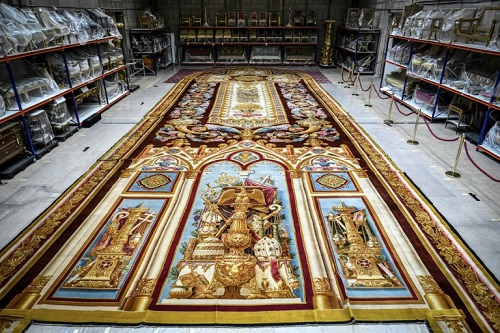This post has already been read 3773 times!
A rare royal tapestry housed at Notre-Dame cathedral in Paris has been spared the water damage officials feared, after firefighters doused the great mediaeval edifice to extinguish last April’s devastating blaze.
The huge tapestry, finished under the reign of king Louis Philippe in 1838, was evacuated from the gothic monument just days after the fire.
It had been stored in two parts in trunks — which protected it from the molten lead falling from the roof, which was destroyed along with the steeple in the April 15 disaster.
But the tapestry had soaked up huge amounts of water, which swelled its weight to three tonnes from just one tonne when it was handed over to France’s Mobilier National, which oversees the country’s collection of valuable furniture and artworks.
“Rolled up, it would have been a bacterial soup” that could have quickly started rotting, said Herve Lemoine, head of the Mobilier National.
“Once it was unrolled, we had to dry it in a huge wind tunnel and then freeze it to keep mould from developing,” Lemoine told AFP this week.
It was loaded into a large container whose temperature was gradually lowered to -35 degrees Celsius (-31 Fahrenheit) over a 24-hour period before it was brought to the Mobilier National’s labs in Paris.
 AFP / STEPHANE DE SAKUTINThe tapestry will now undergo an extensive restoration
AFP / STEPHANE DE SAKUTINThe tapestry will now undergo an extensive restoration
Now on display, the woollen tapestry — 25 metres (82 feet) long and 7.35 metres wide — stills shows traces of humidity and other stains, along with some moth damage and rips in the weave.
Yet the colourful cornucopias and vivid crowns of flowers based on a design by French painter Jacques-Louis de la Hamayde can still be seen, and technicians will now embark on months of restoration work.
“We’re doing this at no cost for the diocese — it’s important to show that as part of the national effort, an institution like ours can do its part,” Lemoine said.
After its first public display at the Louvre museum in 1838, the tapestry was brought to Notre-Dame in 1843 for the coronation of Napoleon III.
Since then it has been displayed only rarely: during a visit by the Tsar Nicolas II, the country’s first televised mass in 1948, or the first visit by pope Jean Paul II to the cathedral in 1980.
The public will have a chance to see it during an open house at the Mobilier National during the European Heritage Days on September 21-22.
[AFP]



